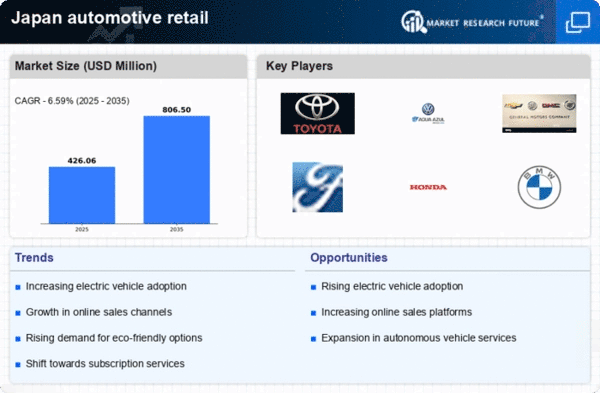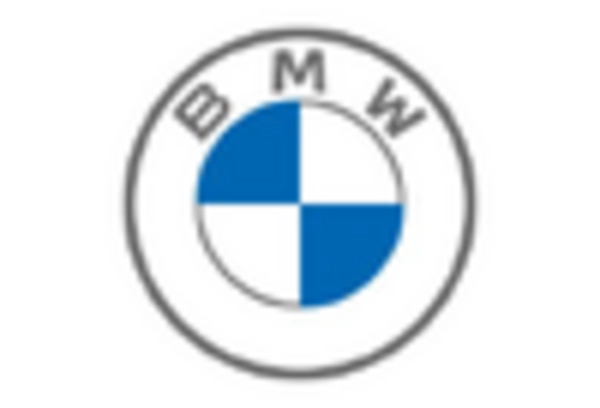Shifts in Consumer Preferences
Consumer preferences in Japan are evolving, significantly impacting the automotive retail market. There is a growing inclination towards compact and fuel-efficient vehicles, driven by urbanization and environmental concerns. Recent statistics reveal that sales of hybrid and electric vehicles have surged, accounting for over 25% of total vehicle sales in 2025. This shift is prompting retailers to adjust their inventories and marketing strategies to align with consumer demands for sustainability and efficiency. Additionally, younger consumers are increasingly valuing connectivity features and advanced safety technologies, which are becoming essential selling points. As a result, automotive retailers must stay attuned to these changing preferences to effectively cater to the market and enhance their competitive edge.
Impact of Online Sales Channels
The rise of online sales channels is reshaping the automotive retail market in Japan. Consumers are increasingly turning to digital platforms for vehicle research and purchasing, with online sales accounting for nearly 20% of total vehicle transactions in 2025. This trend is prompting traditional dealerships to enhance their online presence and offer seamless digital experiences. Retailers are investing in user-friendly websites and virtual showrooms to facilitate online browsing and purchasing. Moreover, the integration of e-commerce solutions allows for streamlined transactions, appealing to tech-savvy consumers. As the automotive retail market continues to evolve, retailers must adapt to this digital shift to capture a larger share of the market and meet the expectations of modern consumers.
Government Regulations and Incentives
The automotive retail market in Japan is significantly influenced by government regulations and incentives aimed at promoting eco-friendly vehicles. The Japanese government has implemented various policies to encourage the adoption of electric and hybrid vehicles, including tax reductions and subsidies for consumers. For example, the introduction of a subsidy program that offers up to ¥400,000 for electric vehicle purchases has stimulated market growth. These initiatives not only support environmental goals but also create a favorable landscape for automotive retailers to expand their offerings. As a result, compliance with these regulations is becoming increasingly crucial for retailers, as failure to adapt could lead to lost sales opportunities in a market that is progressively leaning towards sustainability.
Economic Factors and Consumer Spending
Economic conditions play a pivotal role in shaping the automotive retail market in Japan. Fluctuations in consumer spending power, influenced by factors such as employment rates and inflation, directly affect vehicle sales. In 2025, the Japanese economy shows signs of recovery, with consumer confidence rising, which may lead to increased spending on automobiles. Data indicates that a 1% increase in disposable income could potentially boost vehicle sales by approximately 2%. Additionally, the availability of financing options and competitive interest rates are likely to encourage consumers to make purchases. Automotive retailers must remain vigilant in monitoring economic indicators to effectively strategize and align their offerings with consumer purchasing capabilities.
Technological Advancements in Automotive Retail
The automotive retail market is experiencing a notable transformation due to rapid technological advancements. Innovations such as artificial intelligence and machine learning are enhancing customer experiences, enabling personalized services and efficient inventory management. For instance, the integration of AI-driven chatbots in dealerships has improved customer engagement, leading to increased sales. Furthermore, the adoption of augmented reality (AR) tools allows potential buyers to visualize vehicles in a virtual environment, thereby influencing purchasing decisions. According to recent data, approximately 30% of consumers in Japan express a preference for dealerships that utilize advanced technology in their sales processes. This trend indicates a shift towards a more tech-savvy consumer base, compelling retailers to adapt and invest in new technologies to remain competitive in the automotive retail market.

















